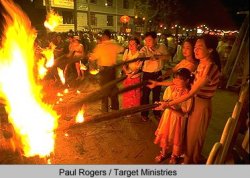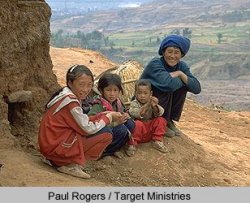
Beginning the Adoption
Selecting a People

What factors will influence the selection of a particular
people?
Decision-making factors may be grouped in three general categories: counsel,
existing links, and statistics. Your committee will first want to discuss
and decide which factors are most pertinent to your decision. As you pray
and gather information based on your criteria, focus will gradually narrow
to the choice God has for you.
 Counsel
Counsel
You may choose to seek counsel at the outset, to steer you through your
information gathering and selection phase or even to simply assign an unreached
people to your group which needs adopting.
-
Adoption Counseling<>
Services: There are agencies who will help you through the adoption
process personally. This can be a big help to answer the questions that
this program may not answer. The program contains a list of adoption<>
counselors that is comprised of two secions. 1.Those counselors associated
with mission support organizations that will provide counseling to anyone.
2. Those from missionary sending agencies general counsel in relationship
to peoples with whom they work.
-
Church Leadership Burden: Does your pastor
or church leaders have a concern for any of the variables on this list?
In one church, the pastor's brother was working among an unreached people,
so the church chose that people for adoption. The enthusiasm of a pastor
for a particular people goes a long way in building the enthusiasm level
of the whole church.
-
Mission Agencies: We strongly recommend
that you contact mission agencies for advice in selecting a people. The
Resource
section of this program lists adoption counselors, missions support organizations
and missionary sending agencies, most of whom can assist in this area.
Existing Links
-
Familiarity: It may be wise to choose
a people already related to your mission program, or to choose one specifically
because you have had no previous involvement in the region--in order to
broaden the scope of your mission outreach.
-
Language Link: Identify what special
language resources are within your congegation. Such abilities could be
especially valuable on a prayer or research journey. One church chose a
particular people because they speak Mandarin Chinese, which several of
the church-supported missionaries also speak. The hope was that the missionaries
could assist, at crucial junctures, in speaking to this people on behalf
of the church.
-
Denominational Link: Some denominations
are eager to provide names of unreached peoples where they are working,
where there are indigenous churches nearby, or which they have targeted
for mission outreach. Contact your denominational mission board to see
what information is available.
-
Local Links: There may be a local group
or church of immigrants from a particular people, or an individual immigrant
in your area who might work with you. Such a group could offer meaningful
local ministry opportunities to your church.
-
Networks/Partnerships: Perhaps you have
links to a congregation in another culture and can partner with them. An
enriching dynamic occurs when churches of different cultures can partner
to reach an unreached people. Both churches adopt the same unreached people
and thereby develop a closer relationship with each other as well as facilitating
a more effective adoption. Or you may already have a relationship with
a church within your own culture that has adopted an unreached people.
You could partner with them. There are agencies who may be able to assist
you in finding other contacts. See Locating<>
Potential Networks or Members.
-
Near-Culture Missionaries: Another link
can be working through a partnership agency
to sponsor a missionary from a culture different than yours to work in
an unreached one. Many times this is more efficient, not only financially,
but in effectiveness. Similarities in culture and language may accelrate
the missionary's orientation and increase his understanding of the new
culture. It is wise to consider the implications of a partnership between
your congregation and a national church body, national mission agency or
national worker.
-
Missionary Links: Your church, as it
promotes the concept of adopting a people, can build upon relationships
with missionaries/tentmakers which your congregation currently supports
who are working among an unreached people. If your church does not have
any individuals working with an unreached people, perhaps one of the agencies
with which your missionaries are connected have ministries to unreached
peoples.
-
Business/Vocational Links: There may
also be natural business or educational ties
to an unreached people. For example, if someone in your church is employed
by an oil company, that person may be able to help secure jobs for qualified
personnel in the Middle East among an unreached people. Medical personnel,
English teachers, and engineers are often wanted by overseas companies.
If your church is already involved locally with teaching English as a second
language, members might choose a people where English teachers are in high
demand. Some churches have assessed their members' skills, talents, and
interests to determine how they might best serve a people. One church identified
its largest resources in the areas of computer technology, medicine, construction,
airline pilots and teachers, and chose a group which would welcome help
in those areas.
Statistics

-
Spiritual Need: Does your church want to go
where almost no one has gone before? The hundreds of cooperating agencies
and churches making up the AD2000 and Beyond Movement are together asking
you to consider choosing a people from the Joshua<>
Project 2000 list. This is not meant to imply that other
peoples are not unreached, but, that researchers have agreed that the Joshua
Project 2000 peoples are the largest ethnolinguistic peoples having the
least access to the gospel. A subset of that list is the regularly updated
Untargeted List,<>
comprising Joshua Project 2000 peoples among whom we have no reported commitment
for church planting.
-
Church Adoptions: Does your fellowship want
to consider a people that no one else has yet adopted, or does it want
one which others have adopted in order to network with them? In reality,
it is unlikely that your church will remain as the only congregation to
adopt your chosen people. A church which is among the first to adopt a
people may initiate a network for that people as other churches become
involved.
-
Size: How large or small a people do you wish
to adopt? Some are only several thousand in number while others are several
million. All the peoples on the Joshua Project 2000 list each number more
than 10,000 in population.
-
Religion: Is there a certain religion or sect
within a religion that your church wants to target? In the Muslim world,
you could adopt Sunni Muslims, Shiite Muslims or a people who practice
folk Islam. Your church may choose either a broad or a specific religious
category.
-
Location: Is geography significant? You may
prefer a people living near missionaries already associated with your church
or denomination. If you intend to send a prayer or research team in the
future, this could be an advantage.
-
Accessibility: Does your church want to send
prayer journey teams, research teams, or church planting teams? Many countries
restrict missionaries from entering their borders (for example, India,
China, or Yemen), but may allow Christians to enter as business professionals
(i.e. tentmaking missionaries). One of the major reasons peoples are
unreached is because they are inaccessible to traditional ways of presenting
the gospel.
-
Livelihood: Does your congregation have
a special affinity for farmers, herdsmen, or fishermen?
-
Demographics: Do you want to adopt an
urban, rural, or nomadic people? The nomadic Mobororo people in Central
African Republic herdsmen have no church or a gospel witness. This could
present some peculiar challenges for a missionary, who might have to adopt
a nomadic lifestyle in order to reach them.
-
Nearby Ministry Opportunities: Your congregation
may want to adopt a people with immigrants living nearby so that it can
minister both in the United States and elsewhere simultaneously. In San
Diego, California, for example, there are over 5,000 Kurds. A church in
San Diego might adopt the Kurds both in Iraq, and San Diego, so that they
can be involved both locally and globally.
-
Miscellaneous factors: Your church may be motivated
to work with the poor, or with refugees (i.e. Somalis living in Kenya).
One church, for example, chose a group that had refugees in Western Europe,
where it could minister freely, since the native country was closed to
traditional missions. Would your congregation choose a people that appears
receptive to the gospel? Should it focus on a people within a "sister-city"
to your community?
There is no end to the number of questions which your church could ask
itself in the selection and adoption process. We hope that the issues raised
here will help your church zero in on some critical elements of its decision-making.
Thanks to Bruce Camp
and the US Center for World Mission for sharing much of the information
which formed the basis of this section. Used by permission. Material first
appeared in ADOPTION: A Practical Guide to Successfully Adopting an Unreached
People Group. To order the complete manual, please contact:
U.S Center for World Mission
Adopt A People Campaign
1605 Elizabeth Street
Pasadena, CA 91104
Phone: (626) 398-2200
Fax: (626) 398-2206
Email: uscwmmob@aol.com
Website: http://www.uscwm.org
Beginning<>
the Adoption | Prayer | Research
| Sustaining the Adoption
AGP<>
Introduction | Adoption | Cooperation
| Individual Involvement | Resources
WebMaster
1/24/99

 Counsel
Counsel
